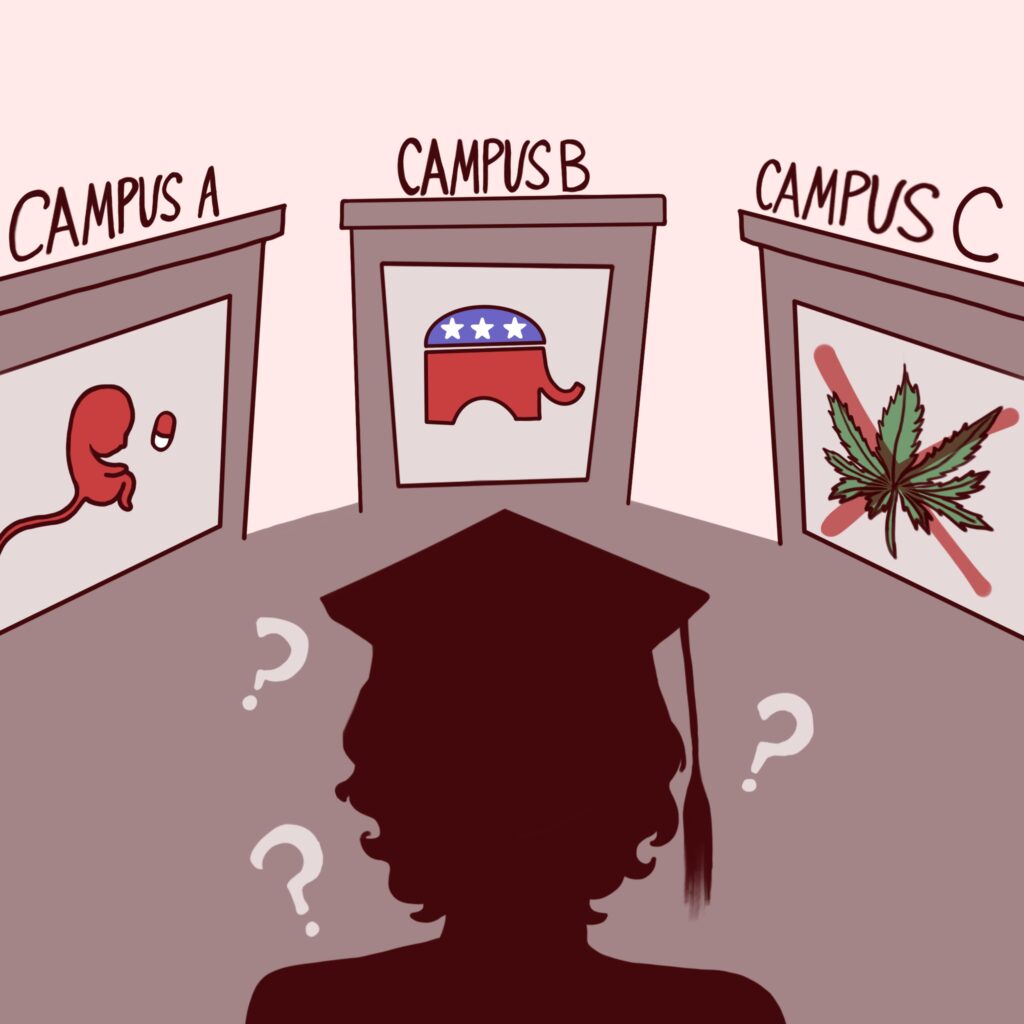
Alexa Sterry
For seniors pursuing college, the application process can weigh heavily on their minds in these next few months. With hundreds of possible options, there are countless factors to consider, like a school’s location, education and culture. As teenagers become politically active, some give importance to the political climate and laws around their schools of interest.
“There have definitely been schools that I originally wanted to go to but decided not to based on the laws that govern that area, such as laws protecting gun rights or revoking reproductive rights,” said senior Arden Salotti.
The political values of the Bay Area can influence student’s values, and therefore, their application process.
“I feel that I’ve been brought up in an environment that really values equality for all,” said senior Devika Mehra. “I’ve really [become] used to it. If I were to be thrown into an environment where hate is readily enforced and normalized by society, I would not be able to properly accept that … Especially being Indian, if I were to experience discrimination to a point where I hadn’t before, that would definitely throw me off my game and make it so I could not properly flourish as a student and focus on what I need to focus on.”
For Salotti, a lack of restrictive gun policy is a serious concern for an area of potential schooling.
“I’ve always been really aware of that,” Salotti said. “[I have] immigrant parents, I’ve seen how other countries work and it’s very intense. I don’t want to be [in] a place that I don’t feel safe in.”
Mehra sometimes considered the political climate of a college above its education.
“Some of the schools that are really good for my major, I don’t even consider just because of their location,” Mehra said. “For example, the University of Florida and Florida State University [are] both really strong schools for my major, but I believe that the state they’re in is not really aligned with my values [since] I’m left leaning. I am trying to stray from these schools [even if they] could benefit me, just because I feel that I wouldn’t be able to thrive properly if I lived in that environment.”
In addition to the political views of the school, the racial demographic is another factor to consider.
“I’ve traveled to a bunch of places across the country and politics have a big influence on representation and the amount of minorities I’ve noticed,” said senior Emma Samayoa. “For example, I passed through the central states like Iowa, and noticed there’s not as much diversity. [So] I’m not applying to any schools there.”
Some students have also taken into account the beliefs of future peers.
“I was looking at some of the states down in the deep south,” Salotti said. ”I do have [the] privilege [that] if I do get into any trouble, I am just one phone call and a flight ticket away to a state where I can get help. It’s not really about the laws that are there as much as it is about the mentality. I want to be around like-minded people where I can feel safe and work together with them.”
Given the wish to study in an environment where they feel safe, comfortable and adequately represented, some students have chosen to apply primarily to schools within California.
“I’m trying to stay in-state with my applications right now,” said senior Kelsey Mallard. “I want to stay near my family as well, but also the cultural norms are something that I’m used to and something that I know I’ll probably thrive better in. I want to advocate for different issues and join clubs that are [going to] have the same interests as me.”
While family is an aspect that many consider, the climate of the location remains a key factor in choosing the right fit.
“I have family in Alabama, so I was considering looking at some schools like Auburn University [or] University of Alabama in Birmingham,” Mehra said. “Both those schools are really strong and what turned me away was just the political climate of Alabama as a whole, [being] just radically conservative. I know if I were to be put in that environment, I would not flourish. I know that I would not be able to resonate with those around me and my community.”
The mentality of fellow students is something Salotti believes students should consider. There seems to be a consensus that campus climate is as important as the academic component.
“I think that people should have an open mind [about] where they want to go,” Salotti said. “But also, always consider the facts. It’s great if you get into a great school that can teach you well and you can get that start into your career, but at the end of the day, who you’re surrounded by is also an insane factor. You don’t want to be around people that are going to treat you unwell or are going to say things that you don’t agree with.”
Overall, as students look forward to their next chapter, they must make decisions on what community they wish to be a part of.




